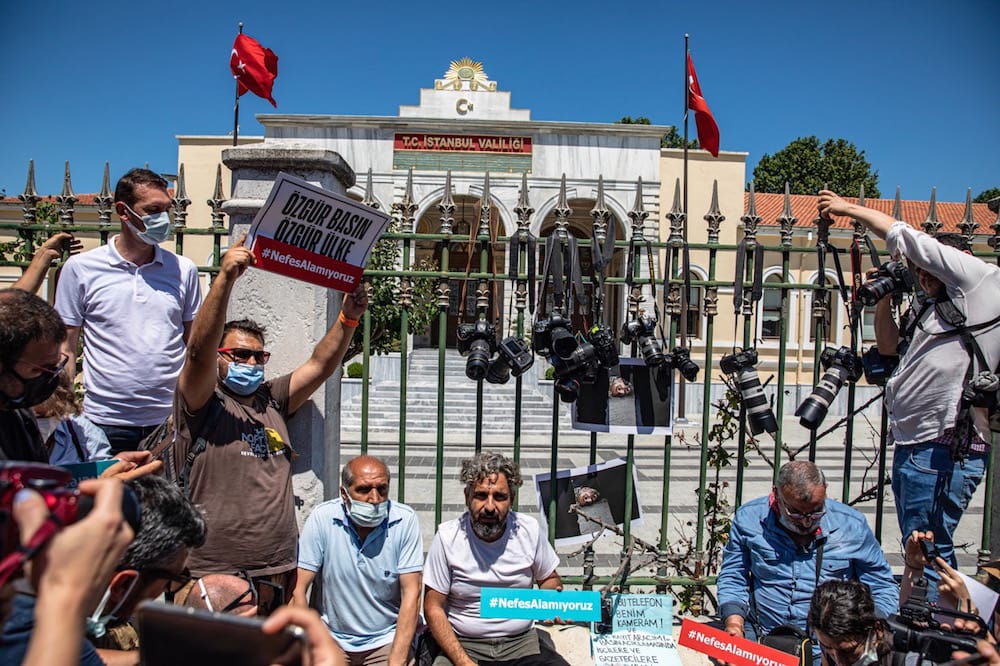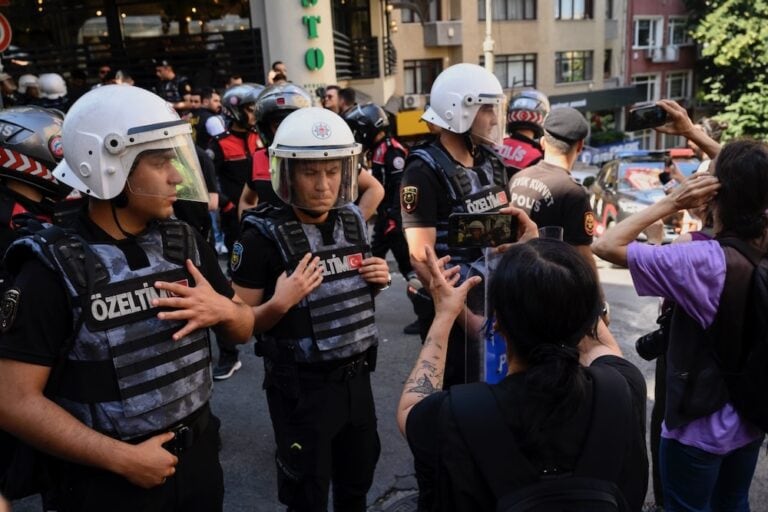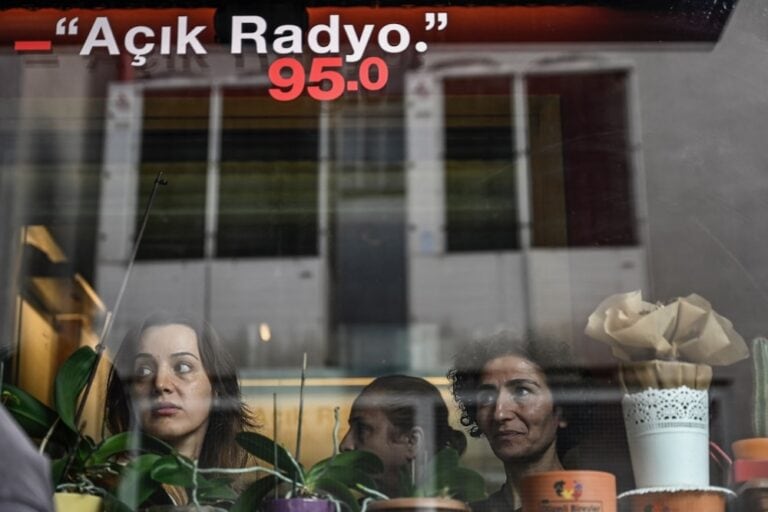Expression Interrupted's report shows that freedom of expression and the media continues to deteriorate in Turkey, despite an ongoing decline in the number of journalists in prison and government "reforms".
This statement was originally published on expressioninterrupted.com on 26 July 2021.
According to the latest freedom of the press report published by Expression Interrupted, 109 journalists stood trial in May and June, four of whom were sentenced to a total of 9 years and 8 months in prison. Police violence against journalists increased; 5 journalists physically attacked
Freedom of expression and the media continues to deteriorate in Turkey, despite an ongoing decline in the number of journalists in prison and the government’s declared commitment to reform, according to our latest regular report.
The Freedom of Expression and the Press Agenda report, based on data obtained from trial and media monitoring work carried out by Expression Interrupted, covers the months of May and June 2021. According to the report, the deterioration is mainly thanks to the repressive government policies, combined with discriminatory practices of politicized public institutions and ongoing judicial violations. Police violence against journalists working in the field, which has markedly increased during the reporting period, is also a factor, exacerbating concerns about the safety of journalists and the public’s access to information.
109 journalists stood trial; 4 journalists sentenced to 9 years and 8 months in prison
During the period covered, Mezopotamya News Agency reporter Mehmet Aslan, who had been jailed pending trial since January, and Cuma Ulus and Erkan Acar, who had been imprisoned since July 2016, were released, bringing the number of journalists jailed in Turkey down to 65. According to data compiled by Expression Interrupted, this number was 87 on the first day of 2021.
However, despite the seeming decrease in the number of imprisoned journalists, the judicial pressure faced by the media in the country has not improved. Trials against journalists continued in the period covered by the report, except during a 17-day Covid-19 lockdown in May. Several new investigations and indictments targeting journalists have also been issued during the period covered.
Some 109 journalists appeared in courtrooms across Turkey in 51 trials throughout May and June. Among them, four were sentenced to a combined prison term of 9 years, 8 months and 2 days. Prosecutors launched new trials against at least four journalists while six journalists faced new investigations in the same period. At least three journalists were taken into custody.
Increase in police brutality and intervention
The report found that the increase in police brutality and interventions targeting reporters, especially those covering public demonstrations, as well as physical attacks on journalists were among the most significant issues faced by the media in Turkey in May and June 2021. At least five journalists were targeted by civilian attackers in the period covered.
Police intervention and brutality against reporters working in the field markedly increased with the implementation of a circular issued in late April by the General Directorate of Security, prohibiting all audio and video recording during public demonstrations. Citing the circular, police used disproportionate force on demonstrators and journalists alike during May Day demonstrations and this year’s Pride Parade on 26 June. Journalists who were trying to cover the demonstrations were physically assaulted by the police; some journalists were violently arrested while some journalists’ equipment was broken by the police during interventions. The knee-on-neck arrest of AFP photojournalist Bülent Kılıç as he was covering the banned Pride parade in Istanbul became a symbol of increasing police brutality against journalists in Turkey. Kılıç was filmed shouting “I can’t breathe!” as police officers pushed him to the ground and pressed their knees against his neck, prompting journalists’ groups to take to the streets in Istanbul, Ankara and Izmir in protest, under the slogan “We can’t breathe.”
Additionally, in May, the government introduced controversial amendments to the Press Card Regulation, which are widely criticized for introducing arbitrary, vague and political criteria to become eligible to receive a press card. Again, during this period, Interior Minister Süleyman Soylu and several politicians from government ally Nationalist Movement Party (MHP) targeted media outlets and journalists in various public statements, exacerbating concerns regarding the safety of journalists and further encouraging censorship and self-censorship.
RTÜK and BİK’s politically motivated decisions
Separately, the report found that throughout May and June 2021, the Radio and Television Supreme Council (RTÜK) and Public Advertising Agency (BİK) – media regulatory bodies which are mandated by law to act independently and impartially – imposed fines exclusively targeting critical media outlets. While the broadcasting watchdog RTÜK imposed administrative fines on Halk TV, KRT TV and FOX TV in this period, BİK gave Evrensel daily a five-day public ad penalty. The latest penalty brought the total public ad ban imposed on Evrensel, which has been unable to run public ads and announcements since September 2019 due to the penalties imposed by BİK, to 103 days.
The report also found that while these two regulatory bodies continued to disproportionately sanction critical media outlets with penalties, they also used the means at their disposal to reward pro-government media outlets.



